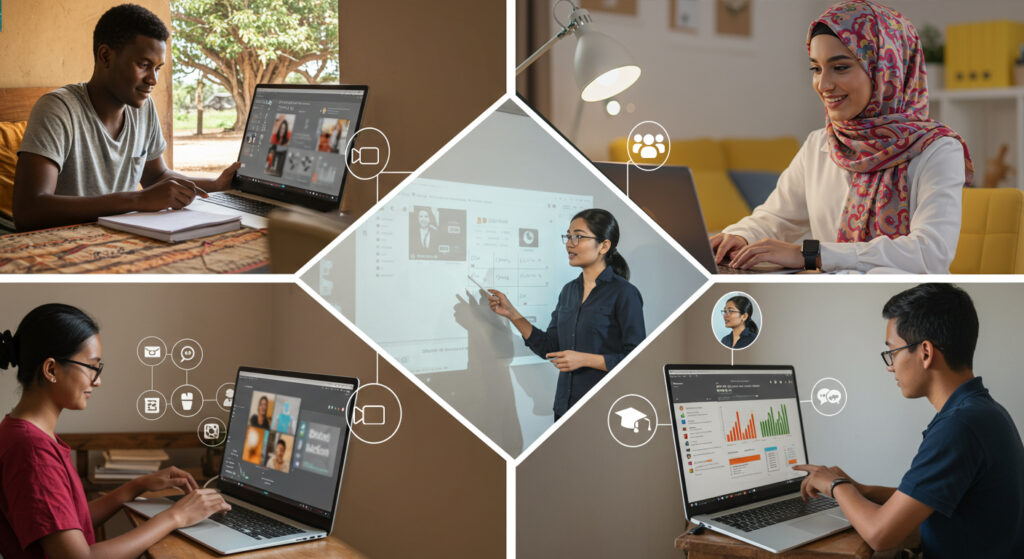Introduction: The Digital Shift in Emerging Markets
Across emerging markets, from sub-Saharan Africa to Southeast Asia, a quiet revolution is underway. Universities are reimagining how they operate, teach, and serve students—powered by the rise of EdTech in emerging markets.
In regions historically constrained by limited infrastructure, staff shortages, and access inequalities, educational technology in developing countries offers a lifeline. EdTech is bridging gaps in access, automating administrative bottlenecks, and unlocking new learning possibilities for millions of students.
At the forefront of this movement are innovative solutions that make digital transformation in higher education not just possible, but scalable and sustainable.
Streamlining Administrative Processes

One of the biggest impacts of EdTech in emerging markets is the modernization of university operations. Many institutions are replacing manual, paper-based systems with digital tools that simplify and speed up core functions such as:
- Student admissions and enrollment
- Transcript and records management
- Grading and result computation
- Communication with students and faculty
For instance, EduTech Global partners with top-tier institutions like Ahmadu Bello University Distance Learning Centre (ABU DLC) to deploy smart, cloud-based platforms (Enroli SIS) that handle thousands of applications and academic records seamlessly.
These systems save time, reduce errors, and improve the overall experience for students, administrators, and faculty. In an era where efficiency is essential, EdTech solutions for universities are transforming operations behind the scenes.
Enhancing Teaching and Learning Experiences

Beyond administration, technology in education in Africa is redefining how learning happens in the classroom—whether physical, virtual, or blended.
With Learning Management Systems (LMS), virtual classrooms, and interactive media, universities are now able to deliver:
- Asynchronous and synchronous learning
- Multimedia-rich content
- Real-time feedback and assessments
- Student progress tracking and analytics
These tools have improved student engagement and retention, especially in remote or underserved regions. The impact of EdTech in emerging markets on pedagogy is clear: it allows institutions to provide personalized, scalable, and dynamic learning experiences.
At EduTech Global, we support universities in integrating LMS platforms (Ediify LMS) that align with their curriculum, enhance interactivity, and foster collaborative learning across geographies.
Expanding Access to Education

Access to higher education remains a significant challenge across emerging markets. Rural populations, displaced individuals, and working professionals often face barriers to attending traditional universities.
Online learning platforms in emerging markets are reversing this trend by making education more inclusive.
- Mobile-first platforms enable learning in areas with limited infrastructure
- On-demand content empowers self-paced learning
- Flexible schedules support working adults and caregivers
- Regional centers and hybrid models increase reach and impact
For example, through our online programs at ABU DLC and Babcock University’s Centre for Open and Distance e-Learning (BUCODeL), thousands of Nigerians have earned NUC-accredited degrees without ever taking a JAMB exam, overcoming traditional enrollment barriers.
This is EdTech in emerging markets at its most powerful—expanding opportunity and creating pathways to upward mobility.
Overcoming Implementation Challenges
Despite its potential, EdTech adoption in emerging markets comes with hurdles:
- Poor internet connectivity and unreliable power supply
- Low levels of digital literacy among students and staff
- Limited funding for infrastructure and devices
However, progress is possible. Here are some effective strategies:
- Public-private partnerships to fund broadband expansion and device distribution
- Faculty and student digital literacy programs to support onboarding and usage
- Modular, mobile-first platforms that reduce data and power demands
- Government-backed EdTech initiatives such as TETFund’s digital learning support programs
At EduTech Global, we help institutions assess their readiness, identify scalable solutions, and deploy platforms that align with their context and capacity.
Future Outlook: Sustainable Integration of EdTech
Looking ahead, the future of EdTech in emerging markets lies in continuous innovation, adaptability, and alignment with local realities.
Key trends include:
- AI-driven learning analytics to personalize student pathways
- Cloud-native infrastructure for scalability and security
- Mobile-first LMS platforms designed for low-bandwidth environments
- Cross-border digital programs expanding global collaboration and access
To ensure long-term success, universities must build strong internal capacity, monitor impact with data, and remain open to iterative learning.
EduTech Global remains committed to guiding institutions through this transition—by offering solutions that are not only innovative, but sustainable and context-aware.
Conclusion: Embracing the Digital Transformation
The transformation of university operations through EdTech in emerging markets is no longer a possibility—it is a necessity. As institutions look to scale quality, reach underserved populations, and improve outcomes, digital tools provide the most practical and powerful means to do so.
Whether it’s streamlining administration, enhancing instruction, or expanding access, EdTech is redefining the higher education experience in the Global South.
At EduTech Global, we’re proud to lead this transformation—empowering universities with the technology, strategy, and support needed to thrive in the digital age.
👉 Let’s build the future of education together. Contact us today.

